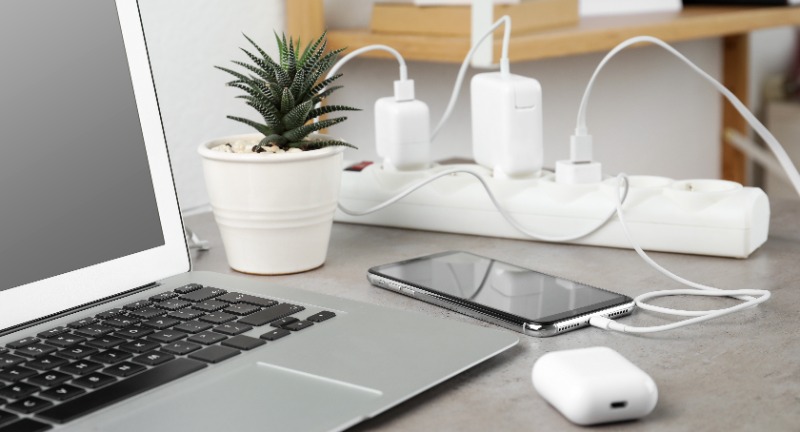NEWS
14 Items Safe for Your Extension Cord (And 9 To Avoid)
Published
2 months agoon

Shutterstock
Extension cords are one of the most convenient tools for powering devices when outlets are out of reach, but using them incorrectly can lead to dangerous consequences. While they’re great for extending electricity to lamps, chargers, and other low-power items, plugging the wrong devices into them can cause overheating, equipment damage, or even house fires. Did you know that appliances like space heaters and refrigerators should never be connected to an extension cord?
Understanding the difference between safe and unsafe usage is crucial for protecting your home and loved ones. In this article, we’ll explore 14 items you can safely plug into an extension cord and 9 you should avoid at all costs.
Lamps

Shutterstock
Lamps are one of the safest devices to plug into an extension cord due to their low power requirements. Whether it’s a decorative table lamp or a bright floor lamp, they typically draw only a fraction of the wattage that an extension cord can handle. This makes them ideal for situations where outlets are not conveniently located. Just ensure the cord is free of damage to prevent any electrical hazards.
Clocks

Shutterstock
Clocks, including alarm clocks or decorative wall clocks, are designed to use minimal electricity, making them a perfect match for extension cords. They are light-duty devices that won’t overload the cord, even if used continuously. This is particularly useful in bedrooms or offices where outlets might be limited. With their low power draw, clocks help maintain a safe and efficient setup.
Phone Chargers

Shutterstock
Phone chargers are incredibly low-power devices that can easily and safely plug into an extension cord. They typically consume less than 10 watts, posing little risk of overheating or overload. This is particularly handy for charging multiple devices simultaneously, as most extension cords have multiple outlets. Always double-check the cord’s condition to avoid any potential short circuits.
Fans

Shutterstock
Small, portable fans are a great example of low-wattage appliances that are extension cord-friendly. These fans provide cooling relief without taxing the cord, even if run for extended periods. They’re perfect for use in bedrooms, offices, or outdoor settings where outlets are sparse. To ensure safety, avoid using high-powered industrial fans, which can draw more current than the cord is rated for.
Christmas Lights

Shutterstock
Designed with safety in mind, Christmas lights are specifically built to be used with extension cords. Their low voltage and energy efficiency allow for multiple strings to be safely connected. This makes decorating for the holidays a breeze, even if outlets are limited. Always opt for extension cords rated for outdoor use if placing the lights outside.
Game Consoles

Shutterstock
Modern gaming consoles, such as PlayStation or Xbox, consume moderate power that falls well within the range of a standard extension cord. They’re a common choice for entertainment setups where multiple devices need power. Just ensure the extension cord isn’t overloaded with other high-power devices. Keeping cords organized also prevents tangling and accidental disconnections during gameplay.
Desktop Monitors

Shutterstock
Desktop monitors are designed to be energy-efficient, making them safe to plug into an extension cord. They typically draw less power than a gaming console or PC tower, ensuring the cord stays within its capacity. This is particularly useful for home offices where outlets might already be occupied. Always use surge-protected cords to safeguard your monitor from power spikes.
Electric Toothbrush Chargers

Shutterstock
Toothbrush chargers are compact, low-wattage devices that can safely operate on an extension cord. This is ideal for bathrooms where outlets are often shared between multiple devices. Their constant but minimal energy use won’t strain the cord. Always ensure the cord is kept dry, especially in humid environments like bathrooms.
Routers and Modems

Shutterstock
Internet devices like routers and modems are specifically designed to run continuously without consuming excessive power. They’re an excellent choice for extension cords, especially in homes where outlets are scarce. Pairing them with a surge-protected extension cord can prevent damage from power surges. This ensures uninterrupted connectivity and peace of mind.
Low Wattage Electric Kettles

Shutterstock
Smaller electric kettles with low wattage can safely run on an extension cord when used sparingly. These compact devices are perfect for offices or small kitchens where outlets might be limited. However, always check the wattage rating of both the kettle and the extension cord. Avoid plugging in high-wattage kettles to prevent overheating.
Humidifiers

Shutterstock
Small, portable humidifiers are another appliance that works well with an extension cord. They’re designed to operate on low power, making them a safe option for bedrooms or offices. Using an extension cord also allows flexibility in positioning the device for maximum comfort. Ensure the cord isn’t exposed to moisture to avoid any electrical risks.
Sewing Machines

Shutterstock
Most sewing machines are low to moderate power devices that can operate safely on an extension cord. This is particularly useful in crafting areas where outlets may not be conveniently located. However, avoid plugging additional high-power devices into the same cord. Keeping the cord untangled ensures smooth operation while you work.
TVs

Shutterstock
Modern LED and LCD TVs are energy-efficient and generally safe to plug into an extension cord. They’re perfect for entertainment centers where multiple devices need power. Using a surge protector extension cord adds an extra layer of safety for your expensive electronics. Always check the TV’s power requirements against the cord’s capacity.
Chargers for Laptops

Shutterstock
Laptop chargers are typically designed for low power consumption, making them safe for extension cords. They provide a convenient solution for workstations far from outlets. To ensure safety, avoid plugging in multiple high-wattage devices alongside your charger. A surge protector is recommended to safeguard your laptop from voltage spikes.
Don’t Plug In Space Heaters

Shutterstock
Space heaters consume a significant amount of electricity and can quickly overwhelm an extension cord. This can lead to overheating, melting, or even fires. Always plug these directly into a wall outlet with a high capacity. Using a dedicated circuit for such appliances is the safest choice.
Don’t Plug In Air Conditioners

Shutterstock
Air conditioners are high-power devices that require a stable and direct connection to a wall outlet. They draw a substantial amount of current, which can easily cause an extension cord to overheat. Using an extension cord may also void the warranty of your AC unit. To ensure safety, install the unit near a dedicated outlet.
Don’t Plug In Refrigerators and Freezers

Shutterstock
Refrigerators and freezers have compressors that demand consistent, high power to function properly. Extension cords can’t handle this load over time and may cause voltage drops. This can damage the appliance and spoil food. Always plug these appliances directly into a wall outlet.
Don’t Plug In Microwaves

Shutterstock
Microwaves require significant power to generate heat, often exceeding the capacity of an extension cord. Overloading the cord can lead to overheating or electrical fires. For safe operation, plug the microwave into a dedicated wall outlet. This ensures efficient performance and prevents hazards.
Don’t Plug In Toasters

Shutterstock
Toasters are high-wattage devices that should never be plugged into an extension cord. The intense heat generated during use can cause cords to overheat and melt. For safety, always use a wall outlet for these appliances. This prevents fire risks and ensures consistent toasting.
Don’t Plug In Coffee Makers

Shutterstock
Coffee makers have heating elements that require more power than an extension cord can handle. This can result in overheating and potential damage to the cord. Always plug coffee makers directly into a wall outlet. This guarantees safe and efficient brewing every time.
Don’t Plug In Hair Dryers

Shutterstock
Hair dryers are among the most power-intensive devices used in households. Their high wattage can quickly overload an extension cord, causing overheating. For safety, always plug hair dryers directly into a wall outlet. This also ensures the dryer operates at its intended power level.
Don’t Plug In Washing Machines and Dryers

Shutterstock
Laundry appliances like washing machines and dryers are designed to operate on dedicated circuits. Plugging them into an extension cord can lead to electrical malfunctions and void warranties. Always use a wall outlet capable of handling their high power needs. This ensures safe and reliable operation.
Don’t Plug In Portable Electric Stoves or Ovens

Shutterstock
Portable stoves and ovens generate significant heat and require high wattage, making them unsuitable for extension cords. The risk of overheating and fire is substantial. Always plug these appliances directly into a wall outlet. This ensures safe and efficient cooking while protecting your home.
Conclusion

Shutterstock
Extension cords are versatile tools that can safely power many household items, but only when used properly. By knowing which devices are safe to plug in and which should be avoided, you can prevent electrical hazards and ensure your home remains secure. Always prioritize safety by using the right cord for the job, inspecting for damage, and avoiding overloading. With these precautions, you can confidently use extension cords to make life more convenient without compromising safety.
Related Topics:

More From Lifestylogy
-


27 Habits To Implement That Could Change Your Life For…
-


21 Phrases Child Psychologists Wish Parents & Grandparents Would Stop…
-


26 Dirtiest Jobs In The World, Would You Brave One…
-


20 Things People Mindlessly Spend Their Money On That Might…
-


21 Mesmerizing Jellyfish Species Enigmas They Conceal
-
If You’re Buying Organic, Start with These 21 Items
-


20 Pieces of Parental Advice We Wish We Embraced Sooner
-


25 Major Challenges Of Caring For A Maine Coon
-


23 Crucial Items Often Overlooked In Wills—Don’t Miss These